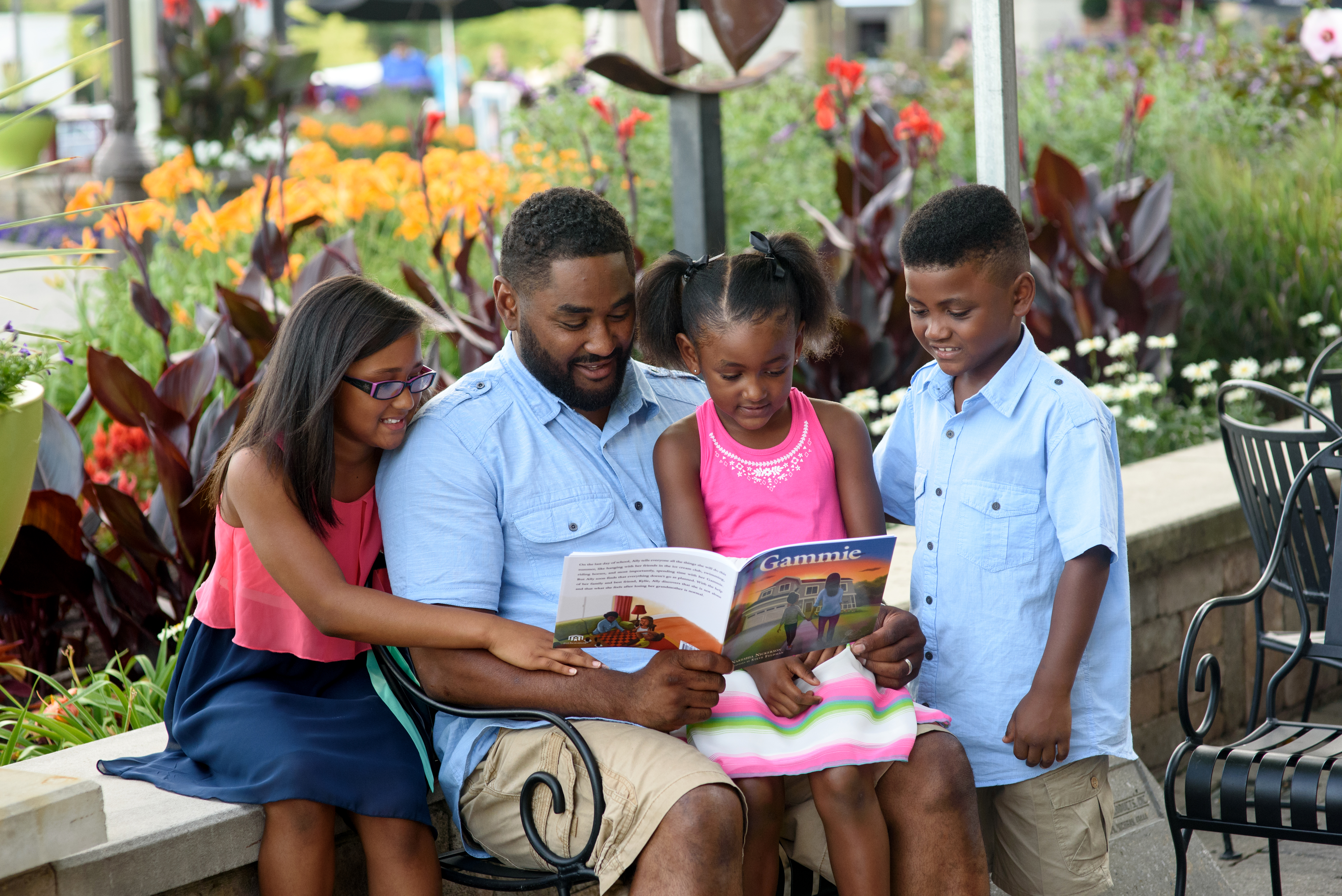How many of us would like to shield our kids, grand children, nieces or nephews from life’s not-so-happy times? Our kids are so precious and innocent to us, we want to keep them safe and out of harm’s way; protect them from the stress, violence, illness, abuse, pain and sadness that can be experienced over time. Unfortunately, these things happen at any age. And While we can’t always protect our little ones from these events, we can give them the love and support they need to cope with their feelings. Helping to develop stable emotional and mental health as they mature.
One of the easiest ways to support our children is through books and reading, which can be a big help in explaining tragic events to our children. Exploring the world of others that have also experienced stress, loss or trauma helps kids feel less alone. They are able to see and learn how others cope and overcome the same grief, emotions and trauma they experience.
Anger, depression, and anxiety are common emotions when a child suffers through a traumatic incident or just don’t know how to manage their feelings. Depending on the availability of support and the way that they cope with the stress, these events can change the way a child views the world. And even though this is so important, few of us talk about these feelings with our youth.
Most of us find ourselves at a loss for words when discussing overwhelming feelings with our kids and teaching them the appropriate skills to become emotionally intelligent.
Positive coping is not always an easy task to practice or to teach.
But it is a meaningful and necessary tool for the growth and development of their emotional intellegence. Social emotional learning is a major development skill that shows up quit frequently, reflecting in how one interacts with others and handles daily and problematic situations. So what about our children? How does she/he react?
A St. Jude’s article illustrates children’s different reactions as:
- Anger/aggression: frustration with an
uncontrollable situation can often be misplaced and directed at people - Crying: a natural emotional release
- Deep breathing or self-calming
technique: a method
that can help distract the child from stress - Denial: disbelief and shock that an event is happening.
- Escape: focus on a specific activity (such as video games
or play) to avoid a stressful situation or pretend it doesn’t exist - Information seeking: desire to know more about a
situation in order to process it or further understand it. Some adults
don’t want information-seeking children to have in-depth details, but
access to those details can help the child cope. - Play: can be used as a release and distraction. Some
children talk about feelings or reenact real-life situations through play. - Rebelliousness: reasserting independence in order
to gain some control - Regression: returning to old routines or
behaviors (such as being clingy). This may remind a child of a time when
life seemed easier. New skills like potty training may seem less important
while the child adjusts to the new routine. - Selective silence: choosing not to talk. Children
have control over when and with whom they speak. This action helps the
child reassert independence and a feeling of control. - Submission: becoming passive or
withdrawn - Use of fantasy: a technique that can be helpful.
For example, a child may view himself or herself as a “super
hero.” This can motivate the child during scary events, etc.
“Whenever a child lacks the skills to effectively respond to or manage a trigger, acting out occurs”
Becoming aware of these behavioral changes will prove to be helpful in the first step of teaching children to cope. If in the event a trigger is not avoided and /or an unforseen situation occurs, acting out or destructive behavior can occur. In my teachings, I use 5 steps to kick coping skills and emotional intellegence into gear.
1. Stay Away from Triggers
Recognizing and avoiding triggers, teaching a child the importance of knowing their own stress triggers, to not engage in certain activities or poor coping skills that has an adverse effect is paramount in overall prevention of outlashes. “Whenever a child lacks the skills to effectively respond to or manage a trigger, acting out occurs” Poor coping skills such negative thoughts- how a kid thinks about these things and what they say to themselves serves as a major trigger. Negative thoughts such as “This is so unfair”, “I don”t have to do this”, “I can do what I want”, “I am not smart, pretty”, or even “This is to hard, I can’t do this” are examples of very poor coping.
2. Take Deep Breathes, Stay Calm
Taking the time to calm down and take deep breathes is a technique that gives children the opportunity to stop, slow down and minimize the progression of anger or frustration. Once calm he/she can move on to the next, possibly most important step in emotional health.
3. Naming their Feelings
Many emotions are confusing to children. However, when a child is able to talk about and describe their feelings, their emotions can feel more manageable. After discovering what they’re feeling it is important they regain their focus on positive things. So naturally the next step is:
4. Remember What They Like About Themselves and Others
Engaging in positive thinking or positive self- talk. “I am kind, respectful, forgiving, patient and smart” “My mom and dad loves me, and my teacher helps me with my homework. They will never hurt me and I don’t want to hurt them” Positive thoughts such as these will remind our children of the type of person they are.
5. Do Your Favorite Things
It is wise to encourage our children to occupy their time and energy into things they enjoy, things that relaxes them.
Lastly; it is never out of the ordinary to seek help when needed. Actually, in a lot of cases it is the wisest conclusion. Having help from others, shows children that there are many factors to healthy wellness. While we may be capable in teaching some areas, there are professionals that can assist in other. For example; If our children feels ill, we seek the help of a doctor, if tooth ache – a dentist. If our children has trouble with spelling or arithmetic we seek the help of a tutor. For driving lessons, to spare our nervous – a driving instructor. So if our children are depressed, angry or overly aggressive, why not schedule an appointment with a counselor?
For more from Nakeshia, visit www.tulvialane.com. Follow her on linkedin or Instagram @tulvialane_childrenbooks @nicnak30

Gammie: Tulvia Lane Children Book Series


